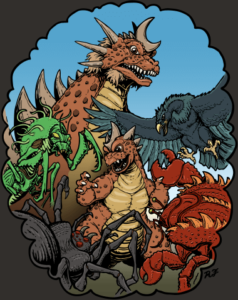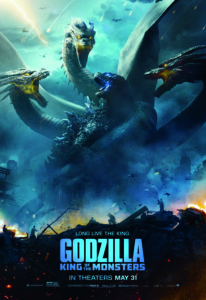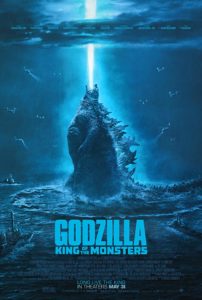(Originally posted here on the Monster Island Film Vault website).

Hello, kaiju lovers!
I’m delighted to say that G-Fest XXVI was the best one I’ve attended yet. While I’m still a bit of a noob to this convention (this was my third year), I was once again impressed with the con-goers’ friendliness and family-like atmosphere. The best part was the sheer amount of support and recognition I received. A few people recognized me from my time on Kaijuvision Radio (which, contrary to some reports, I am the co-creator of that show). I seem to have made an impression on this fan community. I never expected that to happen. I like a lot of things besides Godzilla and kaiju, but it’s here that I’ve made some of my biggest strides of late.
But you didn’t come here to hear me gush. You want to know what happened that weekend.
My brother Jarod and I left early Thursday morning and drove three hours from Fort Wayne, Indiana, to Rosemont, Illinois. We listened to the audiobook of Jurassic Park (a long overdue read for both of us, and an appropriate one for this con) on YouTube as we went. Sadly, we were at a slight disadvantage because we had to stay in the Comfort Inn and not the Crowne Plaza (where the con was held), but there was a shuttle service to G-Fest, and we got a free breakfast every morning. Can’t go wrong there.
Our first order of business after unpacking my 2003 Subaru Legacy (which I named Tatsumaki) was the film screenings at the Pickwick Theatre. It was there we met up with my friend/fellow writer/co-panelist Danny DiManna, author/creator of the Godzilla Novelization Project, and his entourage of family and friends and went to the first of two double features at 1pm: Godzilla’s Revenge and Ghidrah, the Three-Headed Monster. We were a bit late to the first one, but our RiffTrax-style commentary entertained everyone around us. Ghidrah was fantastic on the big screen. Every time I see an older film—even those from as recent as the 1980s—I see how much better their old-fashioned special effects look because this was how they were meant to be seen. It was the dubbed version, but the print was gorgeous.
After that, Jarod and I partook of my G-Fest tradition: Thursday dinner at Giodano’s, a chain of pizzerias that serves true Chicago-style pizza. We split a small deep-dish, which I finished first because Jarod was still learning how to attack such thick pizza.
This was followed by the second double-feature: The X from Outer Space and Godzilla, Mothra, and King Ghidorah: Giant Monsters All-Out Attack. I’d never seen the former, so I was unprepared for how (unintentionally?) hilarious it was. For one thing, it had the worst dub I’ve ever heard. Me and another guy riffed it the entire time. He had one joke that made me double over in my chair. In one of the worst hull breach in space scenes I’ve ever seen, a character gets sucked butt-first into the hole and gets stuck. In defiance of physics, his comrades pull him out and patch the hole. My fellow riffer said, “‘You saved the ship!’ ‘You bet your @$$!’” GMK was, thankfully, subtitled, but the subtitles weren’t entirely accurate.
Friday started bright and early. Jarod and I rode the shuttle there and collected our badges and programs. I met with Danny, and we wandered down to the Kennedy Room to prep for our panel, Sekizawa and Kimura: A Tale of Two Screenwriters, at noon. I took Jarod to the orientation at 11am and went back down at 11:30am. People kept pouring in, especially after the orientation. I don’t know if it was because of it being one of the first panels of the con, the subject matter, or the pre-con hype leading up to it (it was mentioned by at least two podcasts beforehand), but the room was packed. Danny’s girlfriend, Tori, had to be our usher to find seats for people. I’ve never seen that room get that full in all my time at G-Fest. It was thrilling. We weren’t able to go through all of our material, and I wasn’t able to play my podcast trailer for everyone, but it was a resounding success. We want to host another one next year.
If you missed our panel or want to watch it again, here’s the video:
I spent the rest of the day attending a few more panels, including G-pardy tryouts (didn’t make it again), a paleontologist panel on Godzilla, and Kevin Derendorf presenting on kaiju fans in media. That evening we attended the opening ceremony, where the guests gave emotional, heartfelt speeches to the fans (especially Sonoe Nakajima, the daughter of Haruo Nakajima); Akira Takarada picked a kid from the audience to get an expensive Gigan toy; and the kids’ costume parade was held. I then made a brief appearance at what I expect will be the final listener party for Kaijucast, the premiere Godzilla/kaiju podcast, where I collected my prize from their #MemeoftheMonsters contest and educated one fella on the politics of Shin Godzilla.
At 10:30pm, Jarod and I returned to the Pickwick to see Godzilla: King of the Monsters with a theatre full of fans. It was my third time seeing it and his first. G-Fest crowds are famously rowdy, but I’ve never heard them like this. It was glorious! I even squeezed in a joke that got a groan. When a bunch of dead fish floated up after the detonation of the Oxygen Destroyer, I yelled, “That’s a lot of fish!” (My apologies to everyone who was present). The best part was when we all sang along with the new cover of Blue Oyster Cult’s “Godzilla” during the credits. A video of that was shared on Twitter, and both director Michael Dougherty and composer Bear McCreary teared up, it seemed.
Saturday was a whirlwind. As usual, G-Fest is remarkably busy for a con of its size. I never feel like I partake in everything. Panels tend to eat up most of my time. A few highlights: the Akira Takarada interview, where he talked about growing up in China and being wounded by Soviet soldiers as a child; the Shusuke Kaneko interview; the Dawn of the Monsters video game panel (wherein I suggested they add Indianapolis as a location); the Heisei Gamera panel; and the panel on the unmade film Nessie.
I participated in two more panels that day. The first was the Godzilla: King of the Monsters panel with the guys from the YouTube channel DangerVille, among others. Here’s the video of that:
After that was The Art of Kaiju Writing, which I’ve been on every year I’ve gone to G-Fest. (What’s crazy is I got on it in 2017 five minutes before it started—but that’s a story for another day). It was four writers doing a Q&A on the craft of writing and the publishing process. I recorded that panel, too, but it hasn’t been edited or posted yet. Stay tuned! It has a tremendous amount of info for beginning writers.
The traditional evening events followed: awards and the adult costume parade. A guy in an inflatable Godzilla costume, which are a dime a dozen usually, surprised everyone when he turned on some red lights inside the suit, making him Burning Godzilla from KOTM. Well-played, sir!
The Kaiju Crescendo concert was held that night. I wanted very much to go, but I ended up not attending because I wanted to save money (my budget has been tight this summer). I kinda regret it, honestly. But Jarod didn’t want to go and wanted to see Monster Zero at the Pickwick, and since I didn’t want to abandon him, so we went there. A good time was had by all. I heard, though, that attendance was split so much, it was somewhat low for all events that night.
I went to a few panels the next day, but I tried to hit up the places I didn’t get to the rest of the con, like the Mecha-G Arcade, artist room, and dealer hall. I also got autographs from both Akira Takarada and Shusuke Kaneko. Much to my surprise, Takarada-san gave me two signatures! I gave him the booklet to my Criterion copy of Godzilla (1954), which he signed, and then he grabbed the box and signed that, too! What a wonderful man!
The day ended with Kaiju Confessions, a hilarious sing-along to kaiju film songs.
I can’t wait for G-Fest XXVII!




